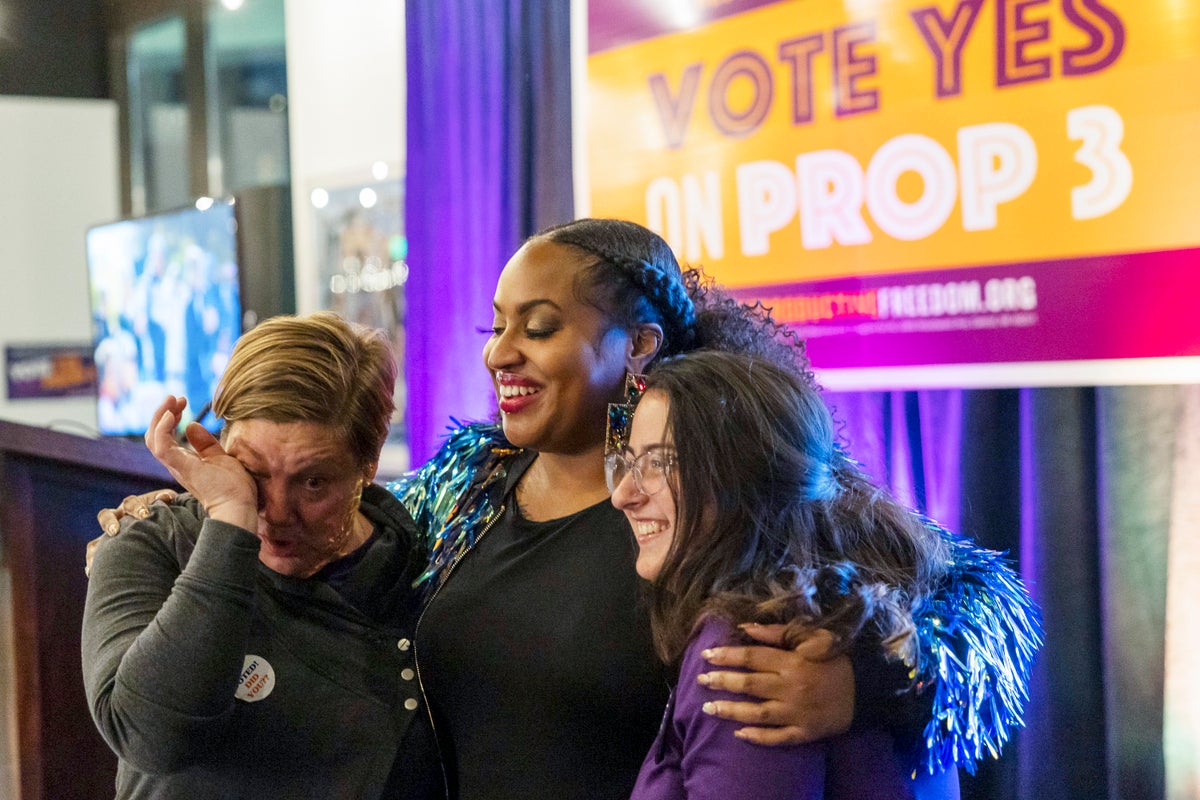
Five months after the US Supreme Court revoked a constitutional right to abortion, voters in three states were the first to enshrine an explicit right to abortion care in their state constitutions.
During a historic sweep of abortion rights referendums across the US in midterm elections, voters in Michigan approved a hard-fought state constitutional amendment that affirms a “fundamental right to reproductive freedom,” effectively overturning the state’s ban on abortion.
The referendum also ensures that the state continues to serve as a critical point of access for midwesterners in the wake of the Supreme Court’s decision to overturn the half-century precedent in Roe v Wade.
“This is a seismic win for abortion rights in a battleground state,” Center for Reproductive Rights president Nancy Northup said in a statement. “This victory is also a win for people in the neighbouring states of Indiana and Ohio, where abortion is banned.”
Voters in Michigan joined Vermont and California to enshrine protections for abortion care in their state constitutions, while voters in Kentucky and Montana appear to have shot down anti-abortion measures in their states.
The Supreme Court’s decision in Dobbs v Jackson Women’s Health Organization ordered that the issue of abortion protections should be left to individual states, igniting legal challenges from abortion rights advocates arguing that their respective states’ constitutional language includes the right to abortion.
More than a dozen states have effectively outlawed abortion access altogether in the wake of that June decision, and Republican state lawmakers have advanced more restrictive anti-abortion laws, upending abortion access for millions of Americans and forcing the closure of dozens of clinics across the US.
But in August, voters in Kansas shocked the country – and a multimillion dollar anti-abortion campaign – with the results of America’s first referendum on abortion rights after the high court’s landmark ruling.
That month, Kansas voters rejected a Republican-proposed state constitutional amendment that would gut protections for abortion care in Kansas, a “red state” that went for Donald Trump in 2020, and which anti-abortion activists anticipated would kickstart a nationwide campaign to end legal abortion.
Instead, Kansas voters underscored the deep unpopularity of political interference with bodily autonomy and reproductive healthcare, triggering a wave of midterm election campaigns that centred on the high stakes for abortion rights – from races that could determine the balance of power in Congress, to state-level races that targeted abortion rights.
On Tuesday, voters in Vermont overwhelmingly approved a ballot measure that protects residents’ right to make their own reproductive health decisions, including abortion care and birth control.
The Vermont for Reproductive Liberty Ballot Committee, which campaigned for the amendment, said “Vermont voters made history tonight.”
“Vermonters support reproductive freedom in all four corners of the state,” the committee said in a message to voters. “They believe that our reproductive decisions are ours to make without interference from politicians.”
Ms Northup said in a statement that Vermont has “set an example of what is possible for other states.”
And in California, voters have approved an amendment to the state constitution to assert that the state “shall not deny or interfere with an individual’s reproductive freedom in their most intimate decisions, which includes their fundamental right to choose to have an abortion and their fundamental right to choose or refuse contraceptives.”
“The largest state in the nation has made it resoundingly clear that abortion access is a fundamental right,” Ms Northrup said in a statement. “As we are seeing in state after state tonight, when people are given the chance to vote directly on the issue of abortion, they overwhelmingly want that right protected. This is not a partisan issue.”
Voters in Kentucky also appear to have rejected a ballot measure that would amend the state constitution to deny the right to abortion.
Abortion care is illegal in Kentucky, except in pregnancies to protect the life of the patient, but the whether those restrictions stay in place depends on legal challenges to state laws and whether courts agree that the state constitution includes the right to abortion.
A so-called “trigger” law that bans abortion in the state without Roe protections was enacted after the Supreme Court’s ruling. In August, Kentucky’s Supreme Court allowed the state’s ban on abortions at roughly six weeks of pregnancy to stand, along with the “trigger” law.
Oral arguments in that legal challenge begin on 15 November.
In Montana, voters also appear to have rejected the Born Alive Infants Protection Act, which would declare that a fetus or embryo that is “born alive” during abortion is entitled to full legal protections.
Opponents warned that the measure was intentionally misleading and based in false characterisations of abortion care, raising the baseless spectre among anti-abortion activists that children are “born alive” after “failed” abortions and then killed.







